How to Write a Text in Line Flow Chart
Formatting Connectors Within Flowcharts in PowerPoint for Windows
Learn about formatting connectors within flowcharts in Microsoft Office applications such as Word, Excel, and PowerPoint for Windows. You can add captions and change the thickness of the connector.
Author: Geetesh Bajaj
Product/Version: PowerPoint for Windows
OS: Microsoft Windows
Learn PowerPoint
Explore guidelines about Smallest Font Size for PowerPoint Slides.
Once you add multiple connectors that emanate from a Decision shape, you need to help your users decide where they branch their thought or work processes within the flowchart. This is typically done by adding a Yes or No caption to the connectors that output from a Decision shape. So how do you add these captions? Look at Figure 1, where we have added two connectors that output from the "Are you happy?" Decision shape. At this point of time, these two connectors don't have Yes or No captions. Depending upon whether the user's answer is Yes or No, they will decide which shape they need to move towards next within the flowchart. The Yes and No captions can be easily added by inserting individual text boxes for both Yes and No, as shown in Figure 2, below. To add such captions beside the connectors, and to format connectors, please follow these steps: Tip: Press the Shift key while dragging the rotation handle so that you can drag in increments of 15 degrees. You'll feel a distinct snap as you rotate at each 15 degree level. Six such snaps equal 90 degrees! Tip: Cannot see the Drawing Tools Format tab on your Ribbon? Make sure you select your Connector so that this tab turns visible! 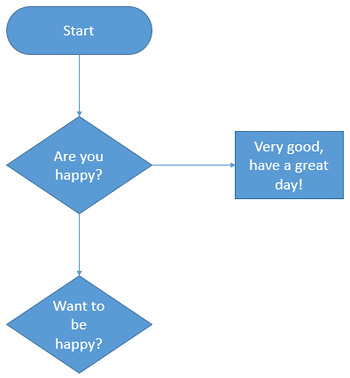
Figure 1: More shapes added to the flowchart 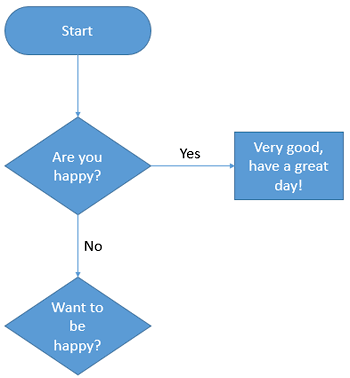
Figure 2: Yes and No captions added
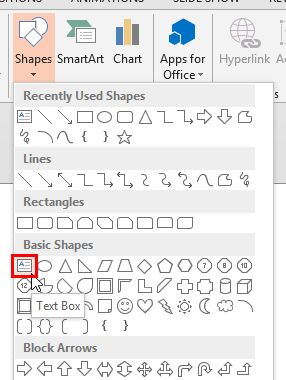
Figure 3: Text Box within the Shapes gallery 
Figure 4: Click and drag the Rotation handle to rotate the text box 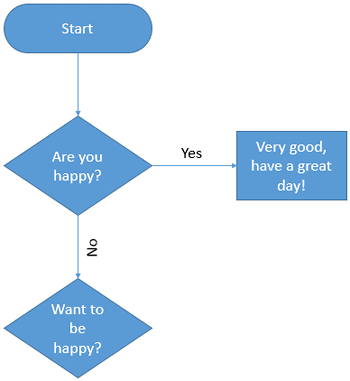
Figure 5: Rotated caption 
Figure 6: Shape Outline button 
Figure 7: Weight option selected within Shape Outline gallery 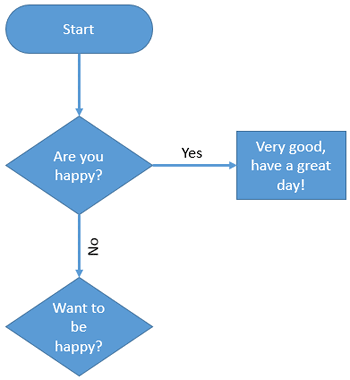
Figure 8: Flowchart with Yes and No captions
See Also:
Advanced Flowchart Techniques: Formatting Connectors Within Flowcharts (Glossary Page)
Formatting Connectors Within Flowcharts in PowerPoint for Mac
You May Also Like: Why Should You Be Using and Mastering PowerPoint's Triggers? | Equatorial Guinea Flags and Maps PowerPoint Templates
Popular Posts

Ten Easy Topics for Pecha Kucha
But what are simple topics, that excite you, and are interesting to your audiences? Of course, if you already have a topic, you need not read further, but if you are still looking for ideas, here are ten easy topics that you can use for your Pecha Kucha presentations.



This is the original page. An AMP (Accelerated Mobile Page) version of this page is also available for those on mobile platforms, at Formatting Connectors Within Flowcharts in PowerPoint for Windows.
Microsoft and the Office logo are trademarks or registered trademarks of Microsoft Corporation in the United States and/or other countries.
Plagiarism will be detected by Copyscape
How to Write a Text in Line Flow Chart
Source: https://www.indezine.com/products/powerpoint/learn/flowcharts/formatting-connectors-within-flowcharts.html
0 Response to "How to Write a Text in Line Flow Chart"
Post a Comment